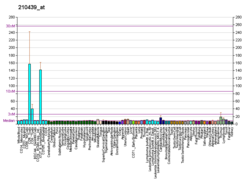CD278
| ICOS | |||||||
|---|---|---|---|---|---|---|---|
| Identifiers | |||||||
| Aliases | ICOS, AILIM, CD278, CVID1, inducible T-cell co-stimulator, inducible T-cell costimulator | ||||||
| External IDs | OMIM: 604558 MGI: 1858745 HomoloGene: 8097 GeneCards: ICOS | ||||||
| RNA expression pattern | |||||||
 |
|||||||
| More reference expression data | |||||||
| Orthologs | |||||||
| Species | Human | Mouse | |||||
| Entrez |
|
|
|||||
| Ensembl |
|
|
|||||
| UniProt |
|
|
|||||
| RefSeq (mRNA) |
|
|
|||||
| RefSeq (protein) |
|
|
|||||
| Location (UCSC) | Chr 2: 203.94 – 203.96 Mb | Chr 1: 60.98 – 61 Mb | |||||
| PubMed search | |||||||
|
|
|||||||
Inducible T-cell costimulator is an immune checkpoint protein that in humans is encoded by the ICOS gene.
CD278 or ICOS (Inducible T-cell COStimulator) is a CD28-superfamily costimulatory molecule that is expressed on activated T cells. It is thought to be important for Th2 cells in particular.
The protein encoded by this gene belongs to the CD28 and CTLA-4 cell-surface receptor family. It forms homodimers and plays an important role in cell-cell signaling, immune responses and regulation of cell proliferation.
Compared to wild-type naïve T cells, ICOS-/- T cells activated with plate-bound anti-CD3 have reduced proliferation and IL-2 secretion. The defect in proliferation can be rescued by addition of IL-2 to the culture, suggesting the proliferative defect is due either to ICOS-mediated IL-2 secretion or the activation of similar signaling pathways between ICOS and IL-2. In terms of Th1 and Th2 cytokine secretion, ICOS-/- CD4+ T cell activated in vitro reduced IL-4 secretion, while maintaining similar IFN-g secretion. Similarly, CD4+ T cells purified from ICOS-/- mice immunized with the protein keyhole limpet hemocyanin (KLH) in alum or complete Freund's Adjuvant have attenuated IL-4 secretion, but similar IFN-g and IL-5 secretion when recalled with KLH.
...
Wikipedia
